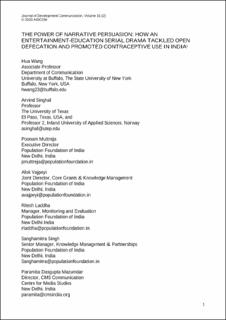The power of narrative persuasion: how an entertainment-education serial drama tackled open defecation and promoted contraceptive use in India
Wang, Hua; Singhal, Arvind; Muttreja, Poonam; Vajpeyi, Alok; Laddah, Ritesh; Singh, Sanghamitra; Mazumdar, Paramita Dasgupta; Srivastava, Alok; Rao, Vasanti; Saini, Sangeeta; Rautela, Dinesh; Seth, Aaditeshwar
Peer reviewed, Journal article
Published version
Permanent lenke
https://hdl.handle.net/11250/2763146Utgivelsesdato
2020Metadata
Vis full innførselSamlinger
Originalversjon
Journal of Development Communication. 2020, 31 (2), 1-13. http://jdc.journals.unisel.edu.my/ojs/index.php/jdc/article/view/183Sammendrag
Television and radio serial dramas have been used as an effective entertainment-education (EE) strategy to address complex health and social issues around the world. In this article, we analyse India’s experience with the EE television serial, Main Kuch Bhi Kar Sakti HoonSeason 3 (I, A Woman, Can Achieve Anything, hereafter MKBKSH-3), broadcasted in 2019. Produced by Population Foundation of India, MKBKSH-3purposely employed principles of narrative persuasion to tackle open defecation, promote contraceptive use, and advocate for gender equality in a deeply entrenched patriarchal system. As part of a larger programme evaluation, we conducted data collection using two complementary methods: (1) field experiments in Uttar Pradesh’s Kanpur Dehat district with repeated measures among viewers and non-viewers; and (2) viewer surveys through the popular interactive voice response system with callers from across 28 states and union territories. Wherever possible, we kept questions consistent to help triangulate research findings. Our results indicate a significant increase in toilet ownership and decrease in open defecation among MKBKSH-3viewers. Further, MKBKSH-3’scharacters and storylines helped raise awareness of injectable contraceptives, and viewers—both male and female—displayed an increased likelihood of moving toward adopting contraceptives that were promoted. These empirical findings add to the growing literature on the value of entertainment-education serial dramas as enabling media for social and behaviour change.

